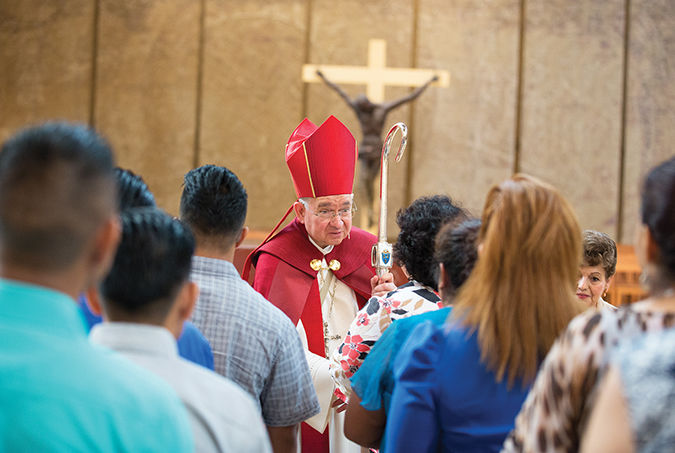This year, the church celebrates Catechetical Sunday on Sept 21, and will focus on the theme, “Teaching about God’s Gift of Forgiveness.” This special celebration affords us the gracious opportunity to reflect on the role that the whole community of faith plays, by virtue of their baptism in handing on the beauty of our faith story and being witnesses to the Gospel.
Pope Francis reminds us that “the joy of the Gospel is the joy of forgiveness. It is the joy of the shepherd who finds his sheep; the joy of the woman who lost her coin; the joy of the father who welcomes home his lost son.”
The theme of God’s mercy weaves through our faith tradition. God never tires of drawing us into this gift of all surrounding grace poured out, overflowing. It is perhaps the most awesome of all of God’s qualities.
Indeed, our God “delights in clemency” (Micah 7:18). His tender compassion is renewed each day, like the rising of the sun. His mercy reaches into the dark spaces of our floundering and our faltering. It enters there, picks us up, holds us and surrounds us until we are healed. If we take our human experience seriously, we will find traces of this challenging mercy and the very wisdom of God’s spirit in the joys and sorrows, hurts and triumphs of our lives.
Mindful of our world situation today, where millions of our brothers and sisters are held captive by the ravages of war, poverty and violence, it becomes ever more critical that our catechetical efforts bring God’s forgiveness and mercy to a world in pain and insecurity.
Mercy must move us, as it moved Jesus, to act with love and integrity, at whatever cost — to do whatever the situation requires of us to resist, expose, advocate, remedy. It is not a puny or sentimental love, but places loving limits and consequences that are sometimes needed.
Forgiveness likewise calls us to be merciful to the offences of others, to be ready to show mercy to those who injure us. St. Stephen, the first martyr fell on his knees and cried out in a loud voice, “Lord, do not hold this sin against them” (Acts 7: 60).
It is vital to remember that genuine forgiveness leads to healing of relationships, but does not ask that we deny the wrong done. Although we long for healing, we find the process arduous and the thought of forgiveness somewhat disturbing. So we are at times tempted to allow anger to nest in our hearts or get involved in revenge.
In our efforts to be merciful, we must remember to be merciful to ourselves. We may have a tendency to sense that we never measure up to other’s expectations; we hang onto our failures; we forget to forgive ourselves. And so we remain paralyzed.
It is the catechist’s and teacher’s privilege and duty to awaken in children, youth and adults a hunger for the healing peace and joy of forgiveness. It is essential that we accompany people on the journey as Jesus did in the Emmaus story (Luke 24), enter their conversation and gently lead them to experience Jesus’ unconditional love in the sacrament of reconciliation — an experience expressed in Evangelii Gaudium (n. 44) “as an encounter with the Lord which may spur us to do our best. ”
With great gratitude for the gift and blessing of several thousand catechists who already serve the faith formation needs of our communities of faith, we are in addition delighted to add new catechetical ministers to their numbers. Last Sunday (Sept. 14), we gathered at the Cathedral of Our Lady of the Angels where those who have completed courses in Basic and Advanced Catechetical Formation and Biblical studies were commissioned by Archbishop José Gomez to minister in the parishes of the Archdiocese.
Their lives of dedicated service will help make God’s forgiveness and mercy seen and experienced as they work tirelessly through the power of the Spirit to transform this vast universe into a place of justice, forgiveness and deep peace.
Religious Sister of Charity Edith Prendergast is the director of the Office of Religious Education.

